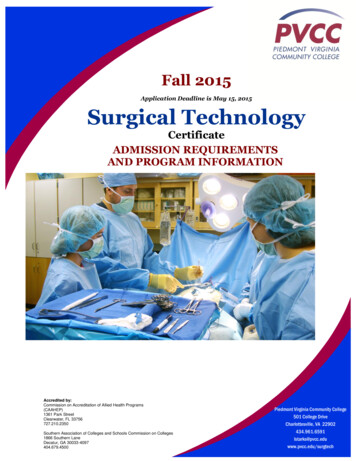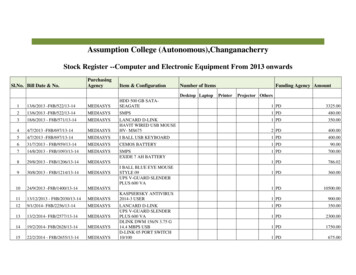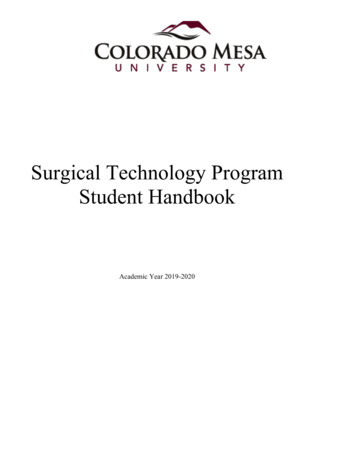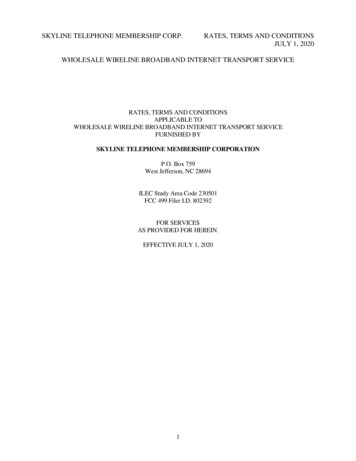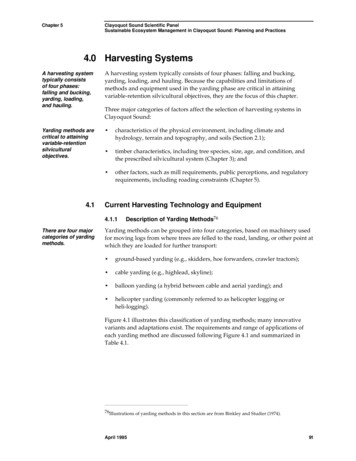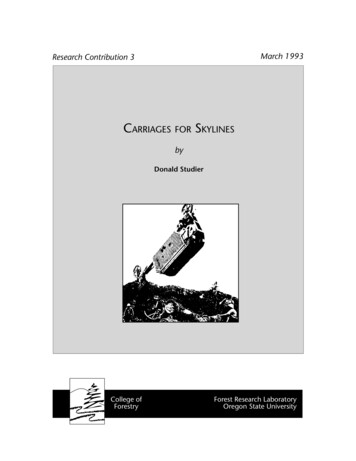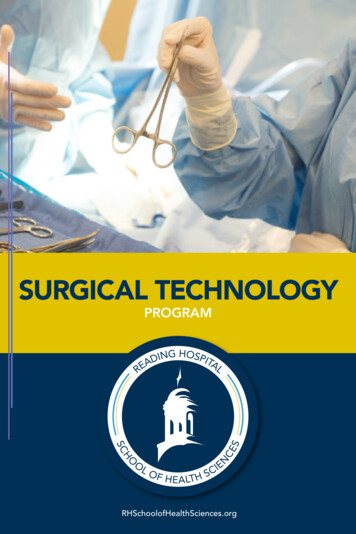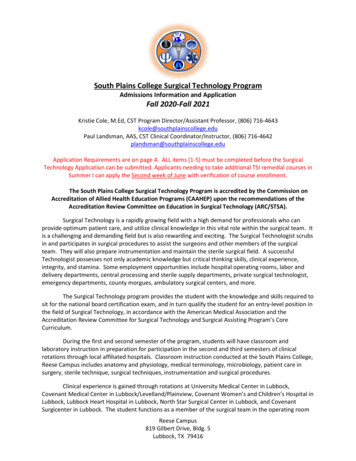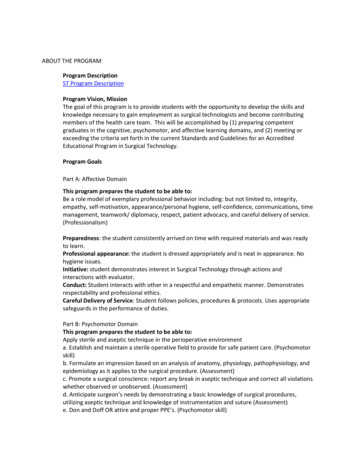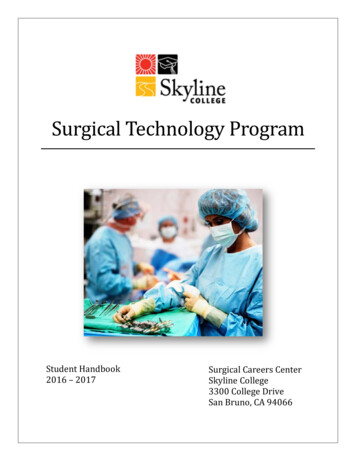
Transcription
Surgical Technology ProgramStudent Handbook2016 – 2017Surgical Careers CenterSkyline College3300 College DriveSan Bruno, CA 94066
Skyline CollegeSurgical Technology ProgramI have received the student handbook in paper and/or digital format,read the policies and procedures, and accept that I am responsible forall the information set forth in the Skyline College SurgicalTechnology Student Handbook.Student Name:Signature:Date:B
Skyline CollegeSurgical Technology ProgramWelcometo the world of Surgical Technology. This an is exciting, challenging, andrewarding career. In this world, you are a perennial student, learning new procedures andtechniques, and meeting new people every day. At worst, it can be stressful, both physicallyand emotionally. At best, it can be fun and a source of pride as you rise to meet the challengesyou will face.The Healthcare Profession needs people like you, people who are willing to work hard tocare for others while braving the risks found in the operating room of today. There can bemuch satisfaction working in the Healing Arts. We, your instructors, wish to tell you howmuch we respect you for taking on the responsibilities of this new career.The Student Handbook is designed to orient you to the Surgical Technology Program and tobe a resource throughout the course. Please, study it carefully prior to the first day ofinstruction. Keep it handy; you never know when you might need the information it contains.Alice Erskine, MSN, RN, CST, CNORProgram DirectorJay Olivares, BSN CSTClinical CoordinatorC
Table of ContentsWELCOME. BPROGRAM CALENDAR . 2GOAL STATEMENT . 3PHILOSOPHY . 4OBJECTIVES . 5ACCREDITATIONS . ERROR! BOOKMARK NOT DEFINED.ADMISSION REQUIREMENTS . 7ACADEMIC REQUIREMENTS . 8PROGRAM REQUIREMENTS . 10PROGRAM OUTLINE. 12RESOURCES. 18POLICIES AND PROCEDURES. 19COURSE DESCRIPTIONS . 42DIRECTORY . 46APPENDIX A: FINAL SKILLS EVALUATION (SURG 451) . 47APPENDIX B: SKILLS CHECKLIST (SURG 443) . 49APPENDIX C: FINAL CLINICAL SKILLS EVALUATION . 51APPENDIX D: SURGICAL CASE TRACKING LOG . 55
Skyline CollegeSurgical Technology ProgramProgram Calendar2016 – 2017Summer 2016MEDA 415: Law and Ethics for the Allied Health ProfessionalsSURG 440: Basic Sciences for Surgical TechnologyJune 6First Day of ClassAugust 10Final ExamAugust 10 ‐ 17Semester BreakFall 2016SURG 441: Patient Care ConceptsSURG 451: Surgical Skills LabAugust 17First Day of ClassSeptember 5Labor Day HolidaySeptember 18 – 24 National Surgical Technologist WeekOctober 12Flex Day (no Classes)November 11Veterans’ DayNovember 26 ‐ 27 Thanksgiving BreakDecember 14Final ExamSpring 2017SURG 442: Surgical SpecialtiesSURG 443: Clinical Practice for Surgical TechnologyThe ST Program begins early again due to a large amount of academic material.January 12First Day of Class (SURG 442)January 16Martin Luther King’s BirthdayJanuary 17First Day of Clinical (SURG 443)February 17Lincoln’s Birthday (Observed)February 20Presidents’ BirthdayMarch 13 – 17Spring BreakMay 19Last Day of ClinicalMay 24Final ExamMay 25Surgical Technology Program GraduationMay 26College GraduationSummer 2017SURG 455: CST Examination PreparationJune 12First Day of ClassJune 26Final ExamJune 30Certification Exam2
Skyline CollegeSurgical Technology ProgramGoal StatementThe Surgical Technology Program’s goal is to provide an opportunity to develop theknowledge and skills needed to perform as a competent entry‐level surgical technologist inthe cognitive, psychomotor, and affective learning domains.AccreditationsSkyline College is accredited by the Commission for Accreditation of Community and JuniorColleges, 3402 Mendocino Street, Santa Rosa, CA 95403. The Surgical Technology Programis accredited by the Commission on Accreditation of Allied Health Education Programs(www.caahep.org) upon the recommendation of the Accreditation Review Committee onEducation in Surgical Technology.Commission on Accreditation of Allied Health Education Programs35 East Wacker Drive, Suite 1970Chicago, IL 60601‐2208312‐553‐93553
Skyline CollegeSurgical Technology ProgramPhilosophyTo facilitate learning, the following concepts are in practice inside and outside the classroom: There is no such thing as a stupid question. Chances are, if you have a question, someoneelse may have the same one. So, ASK IT! In the OR department, we work as a team. Each student learns differently and can serveas a resource for his/her fellow student. Therefore, we encourage the formation of studygroups. Education is participatory. The responsibility for the learning experience belongs to thestudent as well as to the instructors. Learning will take place in an informal atmosphere. Feel free to stop the instructor to askquestions or share information. However, we ask that you respect the rights of anyperson speaking, student or instructor, by raising your hand before you speak. Our office doors are always open. If it is not, please wait outside or leave a message onVoice Mail. We will get back to you. We are both your Instructors and your advisors. Let us know how we can help you meetthe course objectives and your professional goals. If necessary, we can refer you to theappropriate office elsewhere at the College. At the end of the course, the student will have the opportunity to evaluate the instructors.TEACHING METHODS Daily review, question and answer period covering the previous day's assigned reading Self‐instruction modules, written and on computer Lectures, demonstration, audio‐visuals, and class exercises Clinical skills labs, clinical performance and evaluations4
Skyline CollegeSurgical Technology ProgramLEARNING METHODS Own the responsibility to learn ‐ Participate! Be prepared, check the syllabus and course schedule. Read the outline and assignedreadings BEFORE the lecture so misconceptions can be cleared up during the lecture.Read each learning objective and check if each one were met. HINT: Objectives areclues to what the exams will cover. LISTEN FIRST! Then, take notes: use key words. Avoid writing every word –Summarize. Start your own glossary. Write down words or abbreviations you don't knowor circle them while reading. Look them up and add to your glossary. Practice usingthem when discussing the material with your peers. Utilize your classmates for support. Remember, you are all in the same boat. Review class notes every night. Remember: every time you READ ABOUT IT, WRITEABOUT IT, TALK ABOUT IT, you increase your chances of LEARNING IT. If you are having a problem with the course material, or your clinical performance,see the instructor immediately. Above all, make learning FUN!5
Skyline CollegeSurgical Technology ProgramObjectivesAt completion of the Surgical Technology Program, the graduate shall, at the level of anAdvanced‐Beginner, be able to:1. Correlate the knowledge of anatomy, physiology, pathophysiology, and microbiologyto the roles and responsibilities of a Surgical Technologist.2. Recognize the actions and applications of medications used in the perioperativesetting.3. Identify commonly‐used equipment and supplies used in the perioperative setting.4. Apply principles of asepsis to any perioperative event.5. Demonstrate safe practices according to the standards of professional healthcareorganizations with regards to the patient and members of the Surgical Team.6. Perform competently the skills of a Surgical Technologist.7. Apply the knowledge and skills of a Surgical Technologist to address the psychosocialneeds of a surgical patient.8. Use legal, moral and ethical principles to evaluate the care of a surgical patient.9. Acknowledge and value the characteristics of diverse communities.10. Demonstrate professional attributes of a Surgical Technologist.Student Learning OutcomesUpon completion of the program, the student shall be able to:1. Demonstrate knowledge of surgical technology equal to an entry‐level surgicaltechnologist.2. Demonstrate competence in clinical skills equal to an entry‐level surgicaltechnologist.3. Demonstrate behavior appropriate for an entry‐level surgical technologist.6
Skyline CollegeSurgical Technology ProgramAdmission RequirementsPREREQUISITES Math 110 (Elementary College Algebra) Biology 250 (Human Anatomy with Lab) HSCI 484 or BUS 485 (Medical Terminology) Eligibility for English 846 (Writing Development)PHYSICAL ABILITIES Able to stand or sit for 8 hours per day Able to lift and carry 50 lbs. for 20 feet Hands and arms free of skin disease Able to manipulate suture as fine as a human hair either with/without glasses or contacts Effective verbal communication in English without visual cluesTRANSPORTATIONReliable transportation to and from the college, clinical site, and field trip assignment ismandatory. Hospital sites can range from a few blocks to 80 miles away from your homedepending on the availability. Requests for specific clinical placement will be taken intoconsideration; however, there is no guarantee this will be possible.COMPUTER SKILLS Able to access WebSMART, WebACCESS, and other websites/applications Use of a computer, laptop, tablet, and/or smartphone with a reliable internet connection Use of MS Word, MS Excel, and MS PowerPoint NOTE: Due to revisions to the Core Curriculum by the Association of SurgicalTechnologists, the student must be able to demonstrate computer skills in order to passthe national Certification Exam.7
Skyline CollegeSurgical Technology ProgramACADEMIC REQUIREMENTSCourse NameMEDA 415:Law andEthics for theAllied HealthProfessionalsSURG 440:BasicSciencesGraded WorkI. Written AssignmentsII. Weekly QuizzesIII. ProjectsIV. Final ExamNon‐Graded WorkI. Written Assignments1. Medical Terminology – Translate asection of a surgical textbook intolay terms.2. Pharmacology – Research andreport on an ophthalmic medicationusing the internet.II. Weekly Quizzes ( 2 per week)III. Final ExamIV. Professionalism (see page 20 for theAttendance Policy)Self‐learning modules on:OR PharmacologyMicrobiologyConceptual PhysicsSURG 441:Patient CareConceptsI. Weekly Quizzes ( 2 per week)II. Final Exam (comprehensive, includingSURG 440, 441, and 451)8
Skyline CollegeSurgical Technology ProgramCourse NameSURG 451:SurgicalSkills LabSURG 442:SurgicalSpecialtiesSURG 443:ClinicalPractice forSurgicalTechnologySURG 455:CST ExamPrepGraded WorkI. Assignments and QuizzesII. Skills Evaluations (x4)III. Projects1. Oral Presentation2. Video of Skills ProjectIV. Final Skills EvaluationI. Weekly QuizzesII. Final Exam (comprehensive includingSURG 440, 441, 451, 442, and 443)Final Clinical Evaluations (one for eachrotation)Non‐Graded WorkAdditional lab practicetime (3 hours per week)Skills checklist1. Weekly clinicalevaluations from thepreceptor2. Surgical case logs –documentation ofvarious surgicalprocedures the studenthas experience3. OR skills checklist – arecord of clinical skillsacquired by thestudent and verified bythe preceptor4. Clinical journals – dailyreports of the student’sclinical experienceNote: Clinicalevaluations, journals,and time cards must besubmitted everyWednesday.I. AssignmentsII. QuizzesIII. Final Practice Exam9
Skyline CollegeSurgical Technology ProgramProgram RequirementsREQUIRED TEXTSAll textbooks must be purchased prior to the first day of class. Failure to purchase thesebooks will place the student's standing in the program in jeopardy. Textbooks and softwareare available at the Skyline Bookstore one week before the first day of class, or on‐line atwww.amazon.com or other sites.SUMMER / SURG 440:Medical Law and Ethics, 5th Edition, Bonnie Fremgen, 2016, PearsonUnderstanding Anatomy & Physiology: A Visual, Auditory, Interactive Approach, 2nd Edition,Sloan Thompson, 2015, FA DavisAny Medical Dictionary, textbook or software. Examples: Mosby’s, Taber’s, or Dorland’sFALL/ SURG 441 & 451:Surgical Technology for the Surgical Technologist, Fourth Edition, AST, Inc., 2014, DelmarCengage LearningDifferentiating Surgical Instruments, 2nd Edition, Rutherford, 2012, F.A.Davis CompanySurgical Technology Laboratory Manual, Olivares, 2016SPRING/ SURG 442 & 443:Alexander’s Surgical Procedures, Rothrock & Alexander, 2012, MosbyRECOMMENDED TEXTS(Available at Amazon.com or www.ast.org)Microbiology for Surgical Technologists, Price & Frey, 2003, Thomson Delmar LearningPharmacology for the Surgical Technologist, 2nd Edition, Snyder & Keegan, 2006, SaundersInstrumentation for the Operating Room, Eighth Edition, Tighe, 2012, MosbySurgical Instruments, 4th Edition, Wells & Bradley, 2010, SaundersPocket Guide to the Operating Room, 3rd Edition, Goldman, 2008, F.A.DavisEthics, Legal Issues, and Professionalism in Surgical Technology, Jackson, 2007, ThomsonDelmar LearningSuture and Surgical Hemostasis, Pienik, 2006, SaundersDifferentiating Surgical Equipment and Supplies, Rutherford, 2010, F.A.Davis.10
Skyline CollegeSurgical Technology ProgramSUPPLIESRequired:1. Skyline Scrub Suit (top, pants, hat and patch) for Lab Practice2. Skyline I.D. Badge with Lanyard3. Closed Toe Walking Shoes with Leather Uppers (No Sandals or Clogs)Recommended:1.2.3.4.5.Three‐Ring Binders, 3”, severalCollege‐ruled paper, several packages3” x 5” Index Cards (For flashcards)Pocket Dividers for HandoutsLunch bag or CoolerFor Clinical:1. Combination Lock for Locker at Clinical site2. Support Hose for Men or Women (Available at most drug stores)3. Pocket notebook, 4” x 5”, for Clinical notes11
Skyline CollegeSurgical Technology ProgramProgram OutlineMEDA 415: Law and Ethics for the Allied Health ProfessionalsI.Overview of Medical Law, Ethics, and BioethicsII.The U.S. Legal SystemA. Legal TerminologyB. Legal Concepts and DoctrinesC. Classifications of LawIII.Legal System for Healthcare ProfessionalsA. Medical and Nursing Practice ActsB. Standard of CareC. NegligenceD. Scope of PracticeIV.Professionalism, Communication, and TeamworkA. Professional Organizations and CredentialingB. Licensure and CertificationC. Employability SkillsD. Effective CommunicationE. Conflict ResolutionV. Professional Liability and Medical MalpracticeA. Standards of ConductB. Res Ipsa LoquiturC. Malpractice PreventionD. Law of AgencyVI.Workplace Law and EthicsA. Codes of EthicsB. Diversity and Cultural ConsiderationsC. Health and Safety RegulationsD. Workplace Privacy and DiscriminationVII.Patient Medical RecordA. Electronic Medical RecordB. Confidentiality and HIPAAC. Patient RightsVIII. Relevant Ethical and Bioethical Issues in HealthcareA. Genetic EngineeringB. Organ TransplantationC. Contraception, Artificial Insemination, SurrogacyD. Death and Dying12
Skyline CollegeSurgical Technology ProgramSURG 440: Basic Sciences for Surgical TechnologyI.Basic SciencesA. Anatomy and PhysiologyB. PathophysiologyC. MicrobiologyII.Related SciencesA. Operating Room PharmacologyB. Medical TerminologyIII.Biomedical SciencesA. Information TechnologyB. ElectricityC. Conceptual PhysicsD. RoboticsSURG 441: Patient Care ConceptsI.II.Introduction to the ProfessionA. The Surgical Technologist and the Surgical Teami. Roles and Responsibilitiesii. Scope of Practiceiii. CredentialingB. The Patient Care Environmenti. Administration of Perioperative Patient Care Servicesii. Healthcare Organizationsiii. Regulating Agenciesiv. The Operating Room SuiteThe Preoperative PhaseA. Patient Carei. Biopsychosocial Needs of the Patientii. Preoperative Preparation Routines and Review of the Chartiii. Patient’s Rights and Consentsiv. Body Mechanicsv. Transportation and Transfervi. Anesthesiavii. Positioningviii. Hazards and Risk ManagementB. Case Managementi. Case Selection & Room Preparation13
Skyline CollegeSurgical Technology Programii.iii.iv.v.vi.III.IV.Surgical InstrumentsEquipmentHazards and Risk ManagementSurgical Sponges and Surgical CountsAsepsis and Sterile Techniquea. Surgical Attireb. Hand hygienec. Surgical Scrubd. Gowning & Glovinge. Skin Preparation and Urinary Catheterizationf. Creating a Sterile Field and DrapingThe Intraoperative PhaseA. Patient Carei. Homeostasisa. Temperature Regulationb. Vital Signsc. Hemodynamicsii. Emergency Patient Proceduresiii. Hemostasis and Blood Loss Replacementiv. Tissue Replacement MaterialsB. Case Managementi. Basic Routinesii. Variationsiii. Incisions and Exposureiv. Wound Healingv. Wound Closurevi. Dressingsvii. Drains, Tubes and Cathetersviii. Specimen CareThe Postoperative PhaseA. Patient Carei. Postanesthesia Careii. Death and DyingB. Case Managementi. Basic Routineii. Environmental Sanitationiii. Decontamination14
Skyline CollegeSurgical Technology Programiv. Disinfectionv. SterilizationV.Assistant Circulator RoleVI.Professional PracticeA. Professionalismi. Professional Characteristicsii. Communication and teamworkB. Healthcare facility informationi. Healthcare organization and managementii. Physical environmentiii. Hazards to patients and personnelSURG 451: Surgical Skills LabI.II.III.IV.V.VI.VII.The Operating RoomA. Structure and FunctionB. Furniture and EquipmentC. Traffic PatternsOperating Room AttireOperating Room RoutineSurgical InstrumentsA. Identifying Types and FunctionB. Care and Safe HandlingC. Passing of InstrumentsD. Disinfection, Assembly, and SterilizationOperating Room Supplies and EquipmentAseptic TechniqueA. Hand HygieneB. Surgical Hand ScrubC. Gowning and GlovingD. Setting Up a Sterile FieldE. Opening Sterile SuppliesF. Draping the PatientG. Preserving the Sterile FieldH. TroubleshootingPatient CareA. Transportation and Positioning of the Surgical PatientB. Skin PreparationC. Assisting with Hemostasis15
Skyline CollegeSurgical Technology ProgramD. Assisting with Wound ClosureE. ProfessionalismF. Communication SkillsG. TroubleshootingVIII. Mock SurgeryA. General SurgeryB. Minimal‐Invasive Surgery (MIS)i. Diagnostic Laparoscopyii. Laparoscopic Appendectomyiii. Laparoscopic CholecystectomyC. Tonsillectomy and Adenoidectomy (T&A)D. Dilatation and Curettage (D&C)E. Minor Hand and Plastic Proceduresi. Removal of Massii. Lumpectomyiii. Breast BiopsiesSURG 442: Surgical SpecialtiesI.Content FormatA. AnatomyB. PhysiologyC. PathophysiologyD. Diagnostic InterventionsE. Surgical Interventioni. Special Considerationsii. Anesthesiaiii. Positioniv. Skin Prepv. Drapingvi. Incisionvii. Supplies and Equipmentviii. Instrumentationix. Procedural Stepsx. Countsxi. Dressingsxii. Specimen CareF. PrognosisG. Complications16
Skyline CollegeSurgical Technology ProgramII.Surgical SpecialtiesH. Minimally Invasive SurgeryI. General SurgeryJ. Obstetric and GynecologicK. GenitourinaryL. OtorhinolaryngologyM. Plastic and ReconstructiveN. OrthopedicO. OphthalmicP. Peripheral VascularQ. CardiothoracicR. NeurosurgeryS. Oral & MaxillofacialT. TransplantSURG 443: Clinical Practice for Surgical TechnologyI.II.Surgical Case Rotation RequirementsThe Role of the Surgical Technologist in the Scrub Rolea. First Scrub Roleb. Second Scrub RoleIII.Employability SkillsSURG 455: Certification Surgical Technologist Exam PreparationI.II.III.IV.V.Introductiona. Importance of Certificationb. Exam Content Outlinec. Recommended ResourcesStudy Seminara. Reading Methodsb. Study Habitsc. Test Taking StrategiesSurgical Case Managementa. Preoperative Case Managementb. Intraoperative Case Managementc. Postoperative Case ManagementSurgical SpecialtiesPractice Exam17
Skyline CollegeSurgical Technology ProgramResourcesAllied Health Learning Center (Room 7211): FREE Tutoring! By appointment in the learningcenter. Schedule is subject to change and will be posted in the beginning of the semester.Computers, books, CDs, & online resources are available for Surgical Technology students bypermission only.Skyline Library and Interlibrary Loan System (Building 5)Skyline Learning Center (Building 5): FREE! Tutoring in Math, English, Reading, Writing,Test‐taking Skills, Study SkillsAssociation of Surgical Technologists: scholarships, professional development, andpublications (www.ast.org)Association of periOperative Registered Nurses: (www.aorn.org)“The best resources in the universe can only help if you utilize them”DAY CAREThe Children’s Center offers daycare to low income families from 7:30 am to 5:00 pm.Children must be 18 months or older and the parent must show proof of financial need. TheCenter is located behind the Loma Chica School, on the north side of the college campus. Formore information, call 650‐359‐8637. Places fill up quickly, so call as soon as possible.DISABLED STUDENTSIn coordination with the Disabled Students Program, reasonable accommodation shall beprovided to any student deemed qualified by the DSP office. This includes learningdisabilities as well as physical disabilities. If a student has special needs, s/he must see theInstructor on or before the first day of class to submit an accommodation letter and todiscuss these needs. To obtain more information, the DSP office number is 650‐738‐4280.COUNSELINGStudents may find trying to balance work, school, and family a daunting task. The demandsof vocational training can place stress on anyone. People seek counseling for a variety ofissues: careers, class work, finances, anxiety, and problems with instructors.Smart People Ask for Help. Be Smart Call: 650‐738‐445918
Skyline CollegeSurgical Technology ProgramPolicies and ProceduresACADEMIC INTEGRITYPlagiarism is defined as copying another’s work, or taking text from another source andpassing it off as one’s own work. Cheating is defined as copying answers from anotherstudent’s test or obtaining answers from another resource during a test, or changing answersafter the grading of a test. The work you submit must be your own. The Skyline CollegeStudent Handbook has a complete statement defining cheating and plagiarism. If you arecaught cheating, you will receive a zero on the test and must report to the Supervisor of theAllied Health Programs. If there is a second incident, you will be subject to disciplinary actionincluding possible suspension or dismissal from the Program.ASSIGNMENT OF CLINICAL SITEThe clinical coordinator will assign students according to each student’s academicperformance (attendance, grades, and professional demeanor). The location of the facility,time of shifts, and personnel assigned are not guaranteed. Negotiations of assignments areprohibited. A clinical assignment may be rescinded or modified at any time. The clinicalcoordinator will make an effort to obtain a placement within a 50‐mile radius of the student’shome. Refusal of an assignment for any reason will result in the loss of the student’s priority.If a clinical assignment is not completed by the end of the Spring semester, the student willreceive a grade of “Incomplete” and will be offered an opportunity in the Summer semesterif there are sites available and personnel willing to supervise as clinical instructors. Thestudent who refuses an assignment and/or fails to begin their training by the end of theSpring, will receive a grade of “No Pass.” Any student who is unable to complete their trainingby the end of the Summer, will receive a grade of “Incomplete” and will have to return thefollowing year the course is offered (see Returning Student).19
Skyline CollegeSurgical Technology ProgramATTENDANCEAttendance is mandatory. This includes arriving to class and the clinical site on thescheduled time, in appropriate attire, and prepared to report for duty. Regular attendance inclass and clinical is an obligation assumed by every student at the time of registration.ABSENCESTardiness x3 1 absenceAbsences x3 verbal warningAbsences x5 verbal warning, written warning, deduction of points from gradeAbsences x7 disciplinary action including but not limited to being dropped from the courseand dismissal from the program.College policy states: "When repeated absences place the probability of the student's successin doubt, the professor may drop such a student from the course." Absence means non‐attendance for any reason. This is an intensive vocational training program in whichinformation regarding the care of human lives is offered at every class. Any absence may putthe student's chance of success at risk."It is the prerogative of the professor to determine when absences are excessive."SummerThree (3) absences are allowed.FallFive (5) absences are allowed.SpringThree (3) absences per clinical rotation are allowed.***For every day absent over the limit, the student will have five (5) PERCENTAGE POINTSsubtracted from the Final grade for the semester.NOTE: If the hospital management finds the absenteeism of the student to be excessive, theymay request that the student be removed from training. There is no assurance that anotherclinical site can be obtained for the student. Therefore, the student may be subjected todisciplinary action including possible dismissal from the program.20
Skyline CollegeSurgical Technology ProgramTARDINESSFrequent tardiness is seen by O.R. managers as unprofessional and can cost a SurgicalTechnologist his/her job. Therefore, every class day, the student is expected to sign in on theattendance sheet by 8:00 a.m. Every clinical day, the student will be expected to documenttheir hours on a Time Card that will be signed daily by the Operating Room Nurse Manageror Charge Nurse. Time cards are turned into the Instructor on a weekly basis. Three (3)occurrences of tardiness is an equivalent of one (1) absence.NOTE: For excessive tardiness and/or failure to notify the Program office BEFORE the start timeof Class or Clinical days, the student will have five (5) PERCENTAGE POINTS subtracted fromthe next class test. As with any unprofessional behavior, the student will be counseled. If thepattern continues, the student may fail the program.NOTE: O.R. managers routinely review a student’s attendance record before a student isconsidered for clinical placement.NOTIFICATION PROCEDUREIf, for any reason, the student finds that s/he will be late or absent from class or the clinicalsite, said student is expected to:1. Keep office/cell numbers of the Instructors and Clinical sites with him/her at all times.2. Call the office phone or cell number of the Instructors and the Clinical site BEFORE the startof class or the Clinical day and leave a message.3. Whenever possible, give several days’ notice prior to the absence in writing. Do NOTemail the office the day of the absence. O.R. Nurse Managers do not have time to check theemail for absent workers. Neither does the Instructor.LEAVE OF ABSENCEFor leave of absence (LOA) of greater than a week, the student must request a Leave‐of‐Absence in writing from the Program Director. Personal Leaves are granted on a case‐by‐case basis. For Medical Leaves‐of‐Absence, a letter from the student’s physician mustaccompany the request. The letter must describe the malady and the estimated length of time21
Skyline CollegeSurgical Technology Programthe student is unable to attend school. Prior to his/her return from a Medical Leave‐of‐Absence, the student must submit a statement from the physician verifying that the studentstill meets the physical requirements for training in this program. Leaves are grantedaccording to the following and must meet all of the following requirements:1) Student’s academic standing and clinical performance are acceptable and the2) Leave will not place the student’s standing at risk and the3) Malady does not pose a long-term risk to the student working in the O.R.Note: If the request is made during SURG 440 & 441 the Instructor may exercise the policyfor Excessive Absences (See “Attendance”) and withdraw the student. If the request is madeduring SURG 443, the Instructor may require the student to make up the time with ExtendedTraining at the Clinical Site or at another site at a later date. The student
Surgical Skills Lab I. Assignments and Quizzes II. Skills Evaluations (x4) III. Projects 1. Oral Presentation 2. Video of Skills Project IV. Final Skills Evaluation Additional lab practice time (3 hours per week) Skills checklist SURG 442: Surgical Specialties I. Weekly Quizzes II. Final Exam (comprehensive including SURG 440, 441, 451, 442 .


